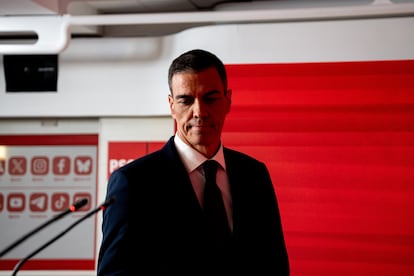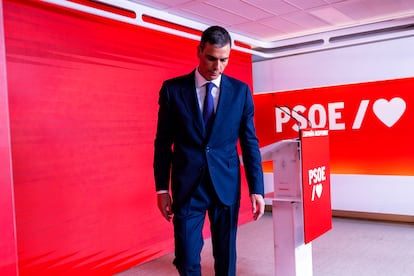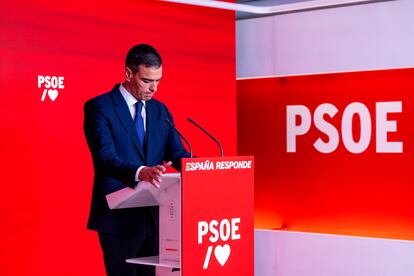Spain’s Pedro Sánchez scrambles to hold government coalition together after top aide is implicated in corruption scandal
The prime minister apologized but has ruled out resigning or snap elections as he faces the biggest crisis of his tenure

For the first time in seven years, Spain’s prime minister Pedro Sánchez seemed truly knocked out Thursday in a public appearance. This time, the crisis affects him directly, because it was he who appointed party secretary Santos Cerdán, who is embroiled in a corruption scandal involving kickbacks in the awarding of public contracts. Sánchez confirmed Santos Cerdán in his role six months ago, even though by then there were already suspicions hanging over this top official of the Spanish Socialist Workers Party (PSOE). In fact, up until the publication of a report by the Central Operative Unit (UCO) of the Civil Guard, one of Spain’s main law enforcement agencies, the prime minister continued to defend him and express confidence in him. But on Thursday, Sánchez dismissed Santos Cerdán, ruled out resigning himself, and bought some time to undertake a profound reshuffle of the PSOE while trying to maintain the reins of government.
Minister of Transportation Óscar Puente has been tipped among the PSOE ranks as a possible replacement for the party’s third-highest official, although nothing seems decided yet.
When the report came out, Sánchez immediately collapsed, according to various sources. Santos Cerdán sat in his seat all morning reading the document and left the chamber saying he would provide explanations. But when Sánchez demanded them, the PSOE’s number three official only said that he didn’t recognize himself in the audio recordings, in which he and former Transportation Minister José Luis Ábalos and the latter’s key advisor, Koldo García, are heard discussing payments and favors, including the handling of a slush fund for bribes of at least €620,000. Santos Cerdán claimed that the voice was not his, that the audio recordings must have been manipulated.
Various members of the government, of the PSOE, and of the governing coalition partners consulted for this story, however, said Sánchez will have to make very profound changes in an attempt to survive what is undoubtedly his worst political crisis in seven years. Sánchez insists he wants to hold out until the scheduled elections in 2027 and isn’t considering bringing them forward or changing the government. But everything hinges of support from his coalition partners of the leftist Sumar, who are very critical at this time and could withdraw their support.
“This term deserves a reset, a turning point. We demand a new era in relations between the PSOE and Sumar. The only way out is through a 180-degree turn from the social perspective,” said Yolanda Díaz, Sumar’s leader and Second Deputy Prime Minister. Aitor Esteban, the leader of the Basque Nationalist Party (PNV) - part of a group of small regional parties that provide support for the governing coalition - was more subdued, stating that “even the PSOE is aware that more explanations are needed.”
The Catalan pro-independence party Junts, which initially ruled out supporting a no- confidence vote, is now calling for a meeting with the PSOE to decide if the current term remains viable. The Republican Left of Catalonia (ERC), meanwhile, is calling for the external audit ordered by Sánchez to be extended to the Ministry of Transportation, but has also ruled out supporting a no-confidence vote. “The [mainstream conservative] Popular Party and [ultranationalist] Vox will never be an alternative to embodying systemic corruption.” The leftist Podemos, for its part, believes that Sánchez’s apologies “fail to hide the truth.”

Sánchez made a public appearance at PSOE headquarters in Madrid, where he hadn’t held a press conference since becoming prime minister. He apologized eight times and tried to stall for time, but without taking any drastic decisions other than forcing the departure of his aide. The prime minister wanted to make it very clear that Santos Cerdán hadn’t resigned of his own free will, but that it was he, Sánchez, who had ousted him.
Throughout Wednesday night and Thursday morning, Sánchez maintained his faith in Santos Cerdán’s word, insisting that the latter had committed no irregularities, and defended him before everyone who questioned him or suggested he be dismissed. It was an almost personal defense.
Sánchez claims that he had no details of the Civil Guard report until it was made public, which suggests that the government has no control — not even indirect information — over the investigations that affect it, something unprecedented in a democracy and which demonstrates something that many within the PSOE have criticized: that Minister of the Interior Fernando Grande-Marlaska does not even have indirect information about things that are happening within his own ministry.
From here on, many unknowns arise, including the very survival of the government, which no one is taking for granted given the severity of the crisis. Sánchez has tried to shield the coalition with the idea that the scandal only affects the PSOE itself because Santos Cerdán was the party secretary but didn’t hold any government positions. But his government partners have also had their say here, and neither Cerdán’s resignation nor Sánchez’s apology are considered sufficient.

Sánchez: no elections until 2027
The government is confident that no one will be interested in supporting a no-confidence vote if opposition leader Alberto Núñez Feijóo of the PP decides to present one, because it would mean making the latter interim prime minister even if it means calling elections immediately and doing so with the backing of the far-right Vox. The difficulty now lies in continuing with a majority that is riddled with loopholes. Sánchez came to power via a motion of no confidence against corruption within the PP in 2018, and many members of parliament who championed this democratic regeneration are now finding it difficult to continue supporting a party whose last two secretaries have been implicated in serious corruption cases.
“There will be no election until 2027. Because this isn’t about me or the Socialist party or PSOE members of Congress; it’s about a political project that’s doing good things for the country. We defend a model that is necessary. This isn’t a government crisis; this isn’t affecting the Spanish government. Cerdán was the PSOE’s organizational secretary,” the prime minister said. But many interpreted his words as a way to buy time ahead of the need to make more drastic decisions in the coming weeks to try to keep the coalition intact.
Sánchez apologized multiple times — to the citizens, to the voters, to the members of his party — and expressed his “deep indignation and sadness” for having trusted Santos Cerdán’s word, who even on Thursday continued to deny involvement in anything illegal. Sánchez said he personally assumes “full political responsibility” for appointing Cerdán and Ábalos, but the decisions remain a matter of a Cabinet reshuffle and an external audit. Nor is an extraordinary PSOE congress or anything similar on the agenda, according to its leader.
The prime minister assumed the mistake of placing his trust in Cerdán very personally. “Until this very morning, I was convinced of Santos Cerdán’s integrity. Like any other person, I have my virtues and I have many shortcomings. Many shortcomings. But I have always believed in working for clean politics and fair play in politics. It causes me enormous indignation and profound sadness to see that an entire political project in which millions of people trust could be affected by the conduct of a few. I once again apologize and ask for forgiveness. The forcefulness will be proportional to the enormous disappointment and indignation,” he concluded.
Sign up for our weekly newsletter to get more English-language news coverage from EL PAÍS USA Edition
Tu suscripción se está usando en otro dispositivo
¿Quieres añadir otro usuario a tu suscripción?
Si continúas leyendo en este dispositivo, no se podrá leer en el otro.
FlechaTu suscripción se está usando en otro dispositivo y solo puedes acceder a EL PAÍS desde un dispositivo a la vez.
Si quieres compartir tu cuenta, cambia tu suscripción a la modalidad Premium, así podrás añadir otro usuario. Cada uno accederá con su propia cuenta de email, lo que os permitirá personalizar vuestra experiencia en EL PAÍS.
¿Tienes una suscripción de empresa? Accede aquí para contratar más cuentas.
En el caso de no saber quién está usando tu cuenta, te recomendamos cambiar tu contraseña aquí.
Si decides continuar compartiendo tu cuenta, este mensaje se mostrará en tu dispositivo y en el de la otra persona que está usando tu cuenta de forma indefinida, afectando a tu experiencia de lectura. Puedes consultar aquí los términos y condiciones de la suscripción digital.









































